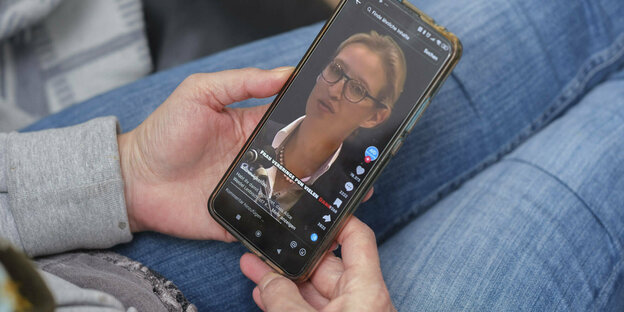Simply shouting “there is no stage for fascists” does not help much. Because they have their own platforms on which the German world is constantly sinking.

The AfD has had its own stages for a long time: it is very present on TikTok Photo: Guido Schiefer/imago
Of course, you didn't see the so-called duel between the two Thuringians, Mario Voigt (the CDU's main candidate for the regional elections on September 1) and Björn Höcke (same role for AfD), and rightly so, because it really hurt me . And why do you have us journalists, who spend Thursday nights getting angry about this and the only consolation on social media is anger, desperate, also fun Listen to the cries of pain of your companions at the same time?
By the way, part of the anger is due to the fact that we are even dealing with this. Can't we just ignore these mock fights in which either everyone talks at once, which is almost unbearable, or the AfD man spreads his nationalist lies, which is even less tolerable?
The dispute over whether the AfD would become smaller if it received less attention from the democratic public has been in full swing for years. However, simply shouting “there is no stage for fascists” does not help much, because the AfD has long had its own stages: it has created much of its importance on its platforms of parallel worlds on the Internet, where the German world is sinking constantly and the lizard creature Merkel is on the verge of ruin, the blonde race works.
There is no doubt that a party like the AfD deserves critical scrutiny. But how exactly can one measure the space that the public media in particular should give the party to speak for itself? Many media scientists firmly believe that AfD representatives should be able to appear on radio and television, not without opposition of course, but also on talk shows and interviews.

This text comes from Laborable day. Our left-wing weekly! Every week, wochentaz is about the world as it is and as it could be. A left-wing weekly with a voice, attitude and a special vision of the world. New every Saturday on newsstands and of course by subscription.
How should the media treat the AfD?
Bernd Gäbler, for example, who prepared two good studies on the subject in 2017 and 2018 for the Otto Brenner Foundation, close to IG Metall, believes that public broadcasting has learned to deal with the AfD reasonably adequately: “I recognize this in general”. greater sovereignty in ARD and ZDF”, he reports.
Of course, a party that constantly publishes meaningless statistics needs live fact checks. But almost more important than correcting fake news, Gäbler says, is addressing the worldview of right-wing populism.
He is obviously a very classical and optimistic illustrator: if you properly describe how stupid and dangerous the short circuits of right-wing extremists are, democratic society will also muster defenses to prevent them from coming to power. What has not yet been answered is how the serious media should deal with the fact that, on the one hand, they do not want to pay unnecessary attention to the AfD, but, on the other, an event like the Voigt-Höcke show develops a The media has a life of its own from which no one can escape.
Maybe it helps to admit that it's a dilemma, not something that's easy to get out of. And then: admit that there are always your own material interests (clicks and reach) in getting caught in the loops of interpretation and outrage. But they should not be decisive. That we must not let the conversation about a functioning democratic public cease. However, politicians like Voigt, who in the electoral campaign only rely on their own advantages, are not good interlocutors for what is coming, that is, the question of the coalition, but they do not have any plan.